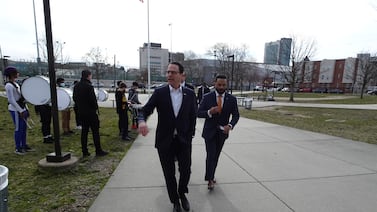This might be the last year that Colorado lawmakers hold back money from K-12 schools to fund other budget priorities.
Legislators have toyed with the idea of fully funding Colorado schools several times in recent years, but always held back amid economic uncertainty. While Colorado’s constitution requires school funding to go up each year by the rate of population and inflation, lawmakers haven’t met that requirement since the start of the Great Recession.
Since 2009, Colorado has withheld more than $10 billion from its schools.
Now the school finance act that passed unanimously out of the Senate Education Committee Wednesday includes a provision that would require the state to fully fund K-12 schools starting in the 2024-25 budget year.
The bill also contains a provision to fund state-authorized charter schools at a level similar to other schools starting in 2024-5. District-authorized charter schools get a cut of locally raised tax dollars. State-authorized charter schools do not.
Senate Minority Leader Paul Lundeen, a Monument Republican and bill sponsor, called these provisions the “within-striking-distance amendments.” Lawmakers could still abandon these promises next year — particularly if economic conditions change — but moving to write them into law is a significant step.
The school finance act also will include even more money for 2023-24 than originally proposed after an impassioned appeal from Weld County Republican state Sen. Barbara Kirkmeyer.
“It’s time for the state Senate and this General Assembly to let the governor and the rest of the state know, no more B.S., no more balancing the budget on the backs of students,” she said. “We’re going to set a priority, and it’s called education.”
Kirkmeyer, who serves on the Joint Budget Committee, pointed out that the state education fund has nearly $1.3 billion, and that Democrats have funded a host of new programs since they took control of the legislature in 2018.
“We pay for people’s bus passes, we pay for people’s utility bills, we pay for people’s rent, we pay for hygiene products, we pay for business licenses, we pay for health insurance,” she said. “We darn well ought to pay for education and put our children first.”
The money to fully fund K-12 education would come from a mix of savings in the state education fund and new revenue. Colorado has so much money in the state education fund because lawmakers slashed school funding in 2020 in anticipation of a COVID-related recession that never materialized. When revenues came in above projections, lawmakers socked much of the money away.
State Sen. Janice Marchman, a Loveland Democrat and teacher, found Kirkmeyer’s argument persuasive. She pointed to widespread teacher shortages, salaries that haven’t kept pace with inflation, students still recovering from learning disruptions, unmet mental health needs in schools, and safety fears. Meanwhile, federal pandemic funding will expire in 2024.
“There is no reason for our state to have a rainy day fund if we don’t recognize that we’re in a rainy day,” she said.
The additional money means the withholding for 2023-24 — known as the budget stabilization factor — would be just $141 million or 1.5% out of a more than $9 billion K-12 budget.
A decade ago, lawmakers withheld 18% of the money that should have gone to schools.
State Sen. Rhonda Fields, an Aurora Democrat, recalled that early in her legislative service, funding was so limited schools were talking about charging students to ride the bus. The prospect of eliminating the budget stabilization factor feels like entering a final frontier.
“I’m looking at Star Trek,” she said. “We can go to places we’ve never gone before. We can meet new people. We can fund our schools.”
At the same time, she said state government has a lot of responsibilities beyond education.
Joint Budget Committee Chair Rachel Zenzinger, an Arvada Democrat and bill sponsor, cautioned lawmakers that education funding commitments will continue to rise and that covering costs next year could require drawing as much as $415 million from the state education fund.
Analysts warn of a looming structural deficit, when growth in state spending, including on mandatory programs, will run up against caps imposed by the Taxpayer’s Bill of Rights or against a recession.
Colorado is also in the process of developing a new way to measure student poverty and may change how it distributes money among schools, changes that may require more funding to avoid hurting some districts.
Meanwhile, funding Charter School Institute schools similarly to other schools is expected to cost more than $42 million. Lundeen said it’s an issue of fundamental fairness. State-authorized charter school students include new immigrants, pregnant and parenting teens, and other students who need significant support, yet these schools have had less money per-pupil.
But unlike the local revenue that districts share with their charters, there’s no dedicated funding source for state-authorized charters.
The school finance act still needs to pass the full Senate and the House and could see yet more changes. It’s the only bill other than the budget that lawmakers must pass before they adjourn May 8.
Bureau Chief Erica Meltzer covers education policy and politics and oversees Chalkbeat Colorado’s education coverage. Contact Erica at emeltzer@chalkbeat.org.







